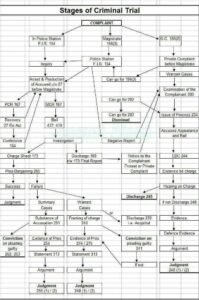Criminal proceedings take place only when an offence is committed.
Any act or omission which is prohibited by law and is punishable by law is a crime. The punishment for such crime is decided by following procedures of criminal trial. The criminal trials in India are well established statutory, administrative and judicial framework. The whole criminal law consists of three main acts –
- Indian Penal Code, 1860
- Code of Criminal Procedure, 1973
- Indian Evidence Act, 1872.
When the common people knew that the nature of offence is criminal. He/She either files a FIR in a local Police Station or File Complaint case in Magistrate Court in his/her jurisdiction. If you can’t get an FIR registered at a police station, then you can approach the local magistrate under CRPC 156 (3) 1973. Under this section, a magistrate is empowered to order the investigation.

Warrant Cases
According to Section 2(x) of Code of Criminal Procedure, 1973 a warrant case is one which relates to offenses punishable with death, imprisonment for life or imprisonment for a term of seven years or more. The trial in warrant cases starts either by the filing of FIR in a police station or by filing a complaint before a magistrate. Later, if the magistrate is satisfied that the offense is punishable for more than two years, he sends the case to the sessions court for trial. The process of sending it to sessions court is called “committing it to sessions court”.
Important features of a warrant case are:
- Charges must be mentioned in a warrant case
- Personal appearance of accused is mandatory
- A warrant case cannot be converted into a summons case
- The accused can examine and cross-examine the witnesses more than once.
- The magistrate should ensure that the provisions of Section 207 are .
- Section 207 of Cr. P.C. 1973, include the supply of copies such as police report, FIR, statements recorded or any other relevant document to the accused.
The stages of trial in warrant cases are given from Section 238 to Section 250 of the Code of Criminal Procedure, 1973.
Summon Cases
According to Section 2(w) of Code of Criminal Procedure, 1973, Those cases in which an offense is punishable with an imprisonment of fewer than two years is a summon case. A summon case doesn’t require the method of preparing the evidence. Nevertheless, a summon case can be converted into a warrant case by the magistrate if after looking into the case he thinks that the case is not a summon case.
Important points about summons case
- A summons case can be converted into a warrant case.
- The person accused need not be present personally.
- The person accused should be informed about the charges orally. No need for framing the charges in writing.
- The accused gets only one opportunity to cross-examine the witnesses.
The different stages of criminal trial in a summon case are given from Section 251 to Section 259 of the Code of Criminal procedure.

